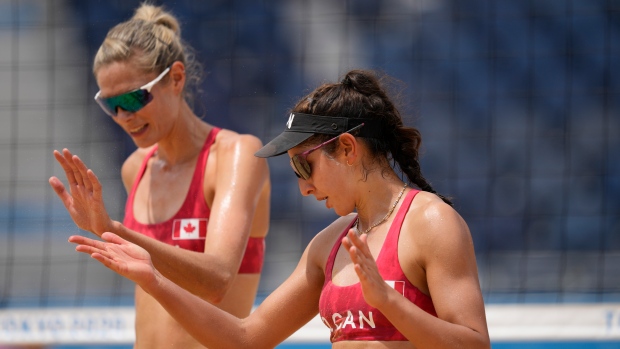Aug 3, 2021
Canada crashes out of Olympic beach volleyball tournament
Canada is heading home from the women's beach volleyball tournament at the Tokyo Olympics empty-handed.
The Canadian Press

TOKYO — Melissa Humana-Parades couldn't explain it.
Along with veteran partner Sarah Pavan, the Canadian beach volleyball duo were rolling over its competition at the Tokyo Olympics.
Having never trailed at the event heading into Tuesday's quarterfinals, the defending world champions looked poised to make the semis — potentially against teammates Heather Bansley and Brandie Wilkerson in what would have been a mouth-watering matchup.
But disaster struck for Canada. Not once, but twice.
Pavan and Humana-Paredes lost in three sets to Australia's Mariafe Artacho del Solar and Taliqua Clancy immediately after Bansley and Wilkerson suffered the same fate against Latvia's Tina Graudina and Anastasija Kravcenoka.
"(It's) going to take weeks ... months, maybe, to make sense of it," an emotional Humana-Paredes, 28, said following the stunning defeat. "At this point in the tournament, you're going to play incredible teams, and Australia is an incredible team. The other teams we played were also very difficult and we prepared just as hard and just as good. We were feeling just as ready for this game. It just didn't manifest on the court — it didn't show up.
"And I don't know why ... I don't know. I don't really have an answer."
Pavan and Humana-Paredes dropped the opening set against the Australians 21-15. They battled back to take the second 21-19 before falling 15-12 in the third at a windy Shinokaze Park.
"We got off to a really slow start, I think that was clear," said Pavan, 34, who also fought back tears. "We're playing catch-up the whole time. We've been in that position before, maybe not in this tournament, and I think we're really good at just moving on.
"We were able to turn it around in set two, and unfortunately, just kind of lost our footing a bit in set three."
Bansley and Wilkerson lost 13-21, 21-18, 11-15 thanks in large part to 13 serve errors compared to the Latvians' eight.
Canada had two shots at getting into the semifinals and would have been guaranteed a spot in the gold-medal game if both squads advanced.
Instead, the program will remain with a solitary bronze won by the men when beach volleyball was first introduced as an Olympic sport at the 1996 Games in Atlanta.
"It definitely stings," said Wilkerson, a 29-year-old from Toronto. "We know we have what it takes."
Bansley, 33, said playing in front of empty stands because of COVID-19 restrictions was a challenge.
"It was trying to find the balance of bringing our own energy and managing the empty stadium," said the product of Waterdown, Ont. "We love playing in (front of) a crowd and love that energy, even if they're not cheering for you ...you still feel it. We missed that. We missed that a lot, the whole game, but it is what it is.
"The other teams were dealing with the same thing."
April Ross and Alix Klineman of the United States defeated Germany's Laura Ludwig and Margareta Kozuch 21-19, 21-19 in the day's first quarterfinal before Switzerland's Anouk Verge-Depre and Joana Heidrich topped Brazil's Ana Patricia Silva Ramos and Rebecca Silva 21-19, 18-21, 15-12.
The Americans and Swiss will play in Thursday's first semifinal at the venue overlooking Tokyo Bay, while the Latvians and Australians are primed go at it for the other spot in the gold-medal showdown.
Bansley and Pavan were partners earlier in their careers, but a four-year run ended after a loss in at the same stage of the 2016 Games in Rio de Janeiro.
Pavan said despite this defeat, she's proud of what her new team has accomplished.
"Melissa and I have done some amazing things together," said the native of Kitchener, Ont. "We have something really special. Everyone's really good at volleyball, but I think we've really taken the time to invest in our relationship.
"I think that will serve us in the long run way more than anything we ever do on the court does."
"Right now it hurts a lot," Bansley added of this part of her journey with Wilkerson ending this way. "Disappointed with my performance ... but I'm just so grateful to be here with Brandie, for the five years we've committed and worked hard together."
Pavan and Humana-Parades, who was one of Canada's alternate in Brazil, are ranked second in the world by the sport's governing body, while Bansley and Wilkerson are tied for 15th.
Wilkerson, another member of the supporting cast five years ago at the Games, said the future of beach volleyball in Canada is bright despite Tuesday's crushing results.
"It's beautiful," she said of having two teams in the Olympic quarters for the first time. "Us four women has known that this is coming for quite some time. We've been putting in work for years. All four of us have been putting ourselves out there financially, emotionally, mentally to be on the world stage and represent this country.
"I hope that for women in sport, it will inspire them and inspire Canadians to pursue beach volleyball and summer sport, and know that we're just a badass country."
Humana-Parades, who's also from Toronto, added she's grateful for her first true Olympic experience, even if it came in the pandemic.
"I'm really, really happy that we were still able to compete here, represent Canada, and still play," she said. "We definitely fell short of our goal, but I think we've learned a lot together over the years. We've experienced incredible things and this is a part of the journey and there's more.
"There's more after this, and ... yeah, there's more."
Just not here in Japan.
This report by The Canadian Press was first published Aug. 3, 2021.
___
Follow @JClipperton_CP on Twitter
